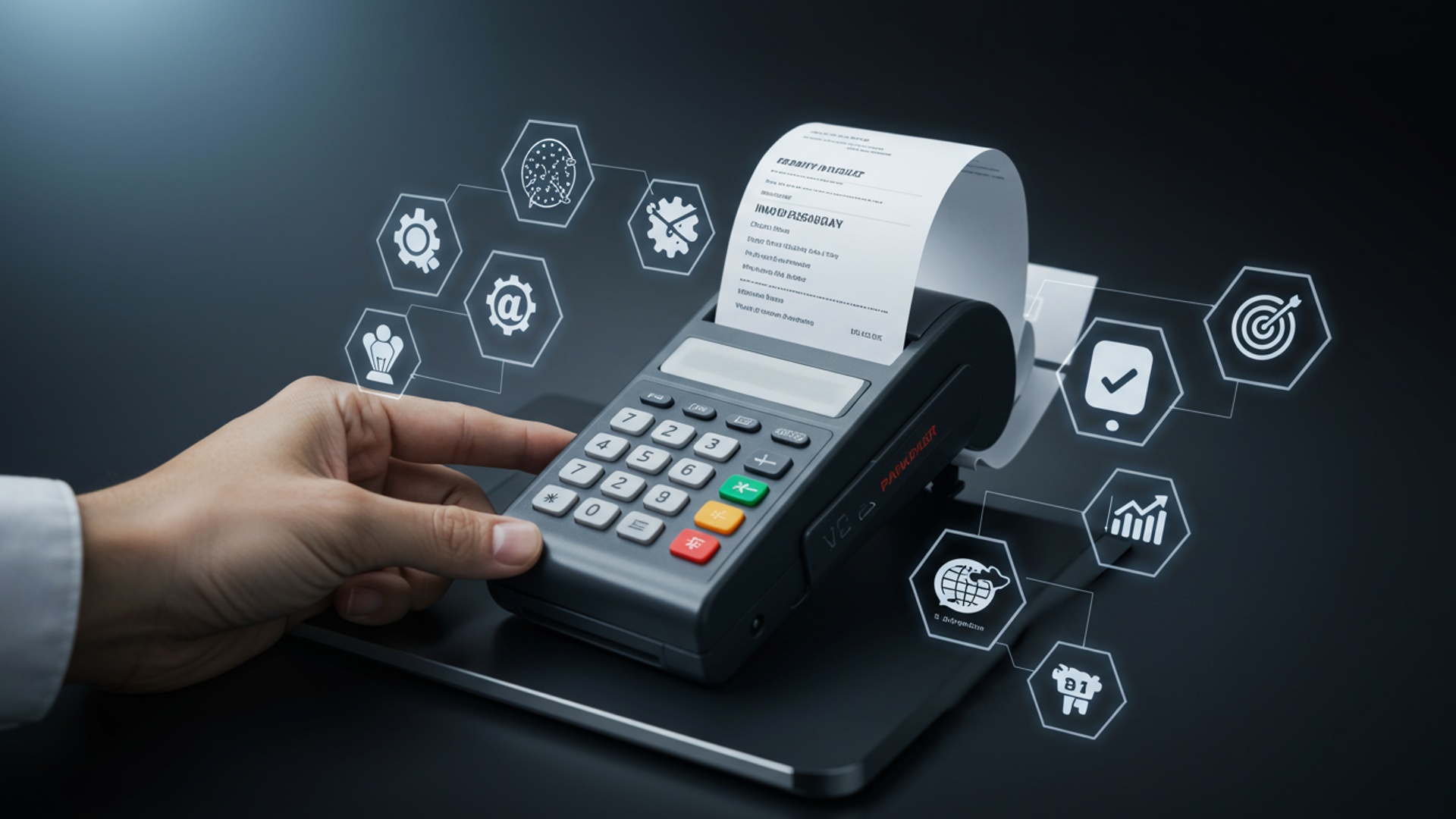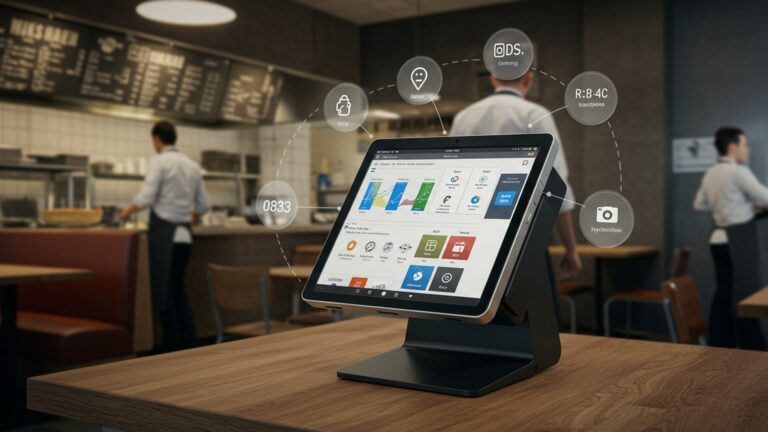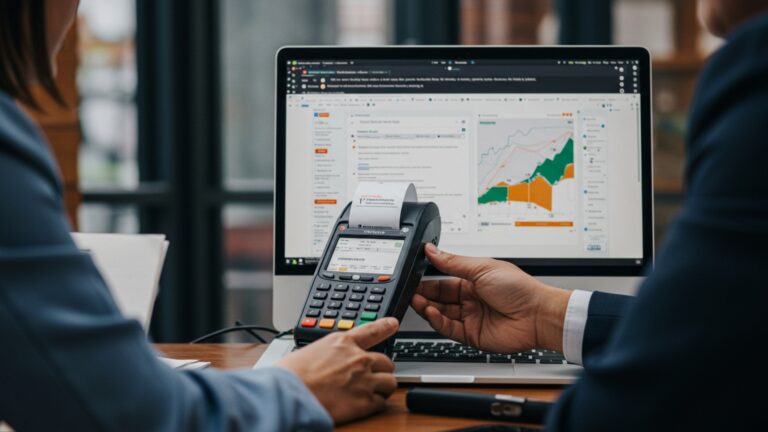Simplify Your Billing Process How to Choose POS Billing Software Solutions
In today’s fast-paced retail and service environments, inefficient billing processes are no longer just an inconvenience; they are a significant competitive disadvantage. Businesses grappling with manual errors, slow transaction times, or fragmented data collection are losing valuable customer loyalty and operational efficiency. The right pos billing software transcends basic transaction processing, transforming into the central nervous system of your operations, from real-time inventory updates and integrated CRM to seamless omnichannel capabilities and insightful sales analytics. Modern solutions now leverage AI for personalized customer experiences and cloud infrastructure for unparalleled scalability, demanding a strategic approach to selection. Understanding these critical advancements is paramount to streamlining checkout, enhancing customer satisfaction. unlocking actionable business intelligence.

Understanding POS Billing Software
In today’s fast-paced business environment, managing transactions efficiently is paramount for success. At the heart of this efficiency for many businesses lies Point of Sale (POS) technology. A POS system is essentially where your customer makes a payment for products or services. It’s the central hub for transactions. its capabilities extend far beyond simply processing payments.
- pos billing software
- pos billing software
The primary goal of implementing robust pos billing software is to simplify and accelerate the billing process, ensuring accuracy and providing businesses with actionable insights into their operations. It’s not just about taking money; it’s about optimizing the entire sales cycle from product selection to payment and beyond.
The Benefits of Implementing Modern POS Billing Software
Adopting a sophisticated pos billing software solution can revolutionize how a business operates, offering a multitude of benefits that extend far beyond just processing sales. These advantages contribute directly to increased efficiency, improved customer satisfaction. enhanced profitability.
- Enhanced Efficiency and Speed
- Accuracy in Transactions
- Comprehensive Inventory Management
- Robust Customer Relationship Management (CRM) Features
- Insightful Reporting and Analytics
- Scalability for Growth
Modern pos billing software dramatically speeds up the checkout process. Barcode scanning, automated price lookups. quick payment processing (including contactless options) reduce customer wait times, especially during peak hours. This efficiency translates directly into a better customer experience and the ability to serve more customers.
Manual entry is prone to human error, leading to incorrect pricing, miscalculated change. inventory discrepancies. POS billing software automates these calculations, ensuring that prices are accurate, discounts are applied correctly. sales totals are precise every single time.
One of the most powerful features of modern pos billing software is its integrated inventory management. It tracks stock levels in real-time, updates inventory automatically after each sale. can even trigger reorder alerts when stock runs low. This prevents stockouts, reduces overstocking. optimizes purchasing decisions. For example, a restaurant can track ingredients, minimizing waste and ensuring popular dishes are always available.
Many pos billing software solutions include built-in CRM capabilities. This allows businesses to capture customer data, track purchase history, manage loyalty programs. even send targeted promotions. Understanding customer buying habits helps in building stronger relationships and driving repeat business.
This software provides a wealth of data through customizable reports. Businesses can examine sales trends, identify best-selling products, interpret peak sales times, track employee performance. monitor profitability. These insights are invaluable for making informed business decisions, from marketing strategies to staffing levels.
As a business grows, its needs evolve. A good pos billing software solution is designed to scale with your business, allowing you to easily add new terminals, expand to multiple locations, or integrate new functionalities without overhauling your entire system.
Key Features to Look for in POS Billing Software
When evaluating different pos billing software options, it’s essential to look beyond the basic transaction processing and identify features that will truly add value to your specific business needs. Here are some critical functionalities to prioritize:
- Integrated Payment Processing
- Advanced Inventory Tracking
- Detailed Sales Reporting and Analytics
- Employee Management
- Customer Management and Loyalty Programs
- Multi-Store Capabilities
- Offline Mode Functionality
- Customization Options
- Robust Security Features
Seamless integration with various payment methods (credit/debit cards, mobile payments, contactless, gift cards) is crucial. The software should support EMV chip card readers for enhanced security and compliance.
Beyond basic stock counts, look for features like variant management (size, color), multi-location inventory, vendor management, purchase order creation. automated reorder points. This level of detail ensures you always have the right products in stock.
The ability to generate comprehensive reports on sales by product, category, employee. time period is vital. Look for customizable dashboards, real-time data. export options to aid in strategic decision-making.
Features that allow for tracking employee hours, managing shifts, assigning roles and permissions. monitoring individual sales performance can significantly improve operational oversight and accountability.
A robust CRM component that stores customer contact data, purchase history. preferences enables personalized marketing and the implementation of effective loyalty programs, encouraging repeat business.
For businesses with multiple locations, the ability to manage inventory, sales. employee data across all stores from a centralized system is a non-negotiable feature. This ensures consistency and simplifies oversight.
Internet outages can halt business operations. A pos billing software that can function offline and automatically sync data once connectivity is restored provides crucial business continuity, preventing lost sales.
The software should be adaptable to your specific business type. This might include customizable receipts, product categorization, pricing rules, or specific industry-related features (e. g. , table management for restaurants, appointment scheduling for salons).
Protecting sensitive customer data and financial data is paramount. Look for PCI DSS compliance, end-to-end encryption for transactions, user access controls. regular security updates to safeguard your business and customers.
Types of POS Billing Software Solutions
The market offers a diverse range of pos billing software solutions, each designed to cater to different business sizes, operational models. industry-specific requirements. Understanding these distinctions is key to making an informed choice.
On-Premise vs. Cloud-Based POS
This is one of the most fundamental distinctions in POS systems, impacting everything from cost to accessibility and maintenance.
| Feature | On-Premise POS Billing Software | Cloud-Based POS Billing Software |
|---|---|---|
| Installation & Hosting | Software is installed directly on your local servers and computers. Data is stored locally. | Software is hosted on remote servers by the vendor, accessible via the internet. Data is stored in the cloud. |
| Cost Structure | Higher upfront cost (software license, hardware, server infrastructure). Lower ongoing subscription fees (sometimes none). | Lower upfront cost (often just hardware). Higher ongoing subscription fees (monthly/annual). |
| Accessibility | Limited to your physical business location(s) or requires complex remote access setup. | Accessible from anywhere with an internet connection (via web browser or dedicated app). |
| Maintenance & Updates | Your responsibility to maintain servers, perform backups. install software updates. Requires IT expertise. | Vendor handles all maintenance, backups. software updates automatically. Less IT burden. |
| Scalability | Can be more challenging and costly to scale (requires additional hardware/infrastructure). | Highly scalable; easily add new users, locations, or features as your business grows. |
| Security | You are fully responsible for data security. Requires robust internal security measures. | Vendor is responsible for data security, often with enterprise-grade encryption and compliance. Requires trust in vendor. |
Industry-Specific Solutions
Beyond the hosting model, pos billing software is often tailored to specific industries, addressing their unique operational demands:
- Retail POS
- Restaurant POS
- Service Industry POS
Designed for shops, boutiques. general merchandise stores. Features often include robust inventory management for diverse product catalogs, variant tracking (size, color), customer loyalty programs. multi-store capabilities. Examples include Square for Retail or Shopify POS.
Optimized for cafes, bars. full-service restaurants. Key features include table management, order customization, kitchen display systems (KDS), split billing, ingredient tracking. integrated online ordering. Examples are Toast POS or Revel Systems.
Caters to businesses like salons, spas, dry cleaners, or repair shops. Focuses on appointment scheduling, employee commission tracking, service package management. customer history for personalized services. Examples include Vagaro or Mindbody.
How to Evaluate and Choose the Right POS Billing Software
Selecting the right pos billing software is a critical decision that can significantly impact your business’s efficiency and profitability. It requires careful consideration of your specific needs, budget. long-term goals. Here’s a structured approach to making an informed choice:
- Assess Your Business Needs Thoroughly
- What kind of products or services do you sell?
- How many transactions do you process daily?
- Do you need inventory management, employee tracking, or customer loyalty programs?
- Are you a single location or a multi-store operation?
- What specific reports do you need to generate?
- Do you require integration with existing accounting software or e-commerce platforms?
- Budget Considerations
- Ease of Use and User Interface (UI)
- Hardware Compatibility
- Vendor Reputation and Support
- Security and Compliance
- Trial Periods and Demos
Before looking at any software, make a detailed list of your business’s unique requirements.
This list will serve as your checklist when evaluating solutions.
Clearly define your budget, considering both upfront costs (hardware, setup, initial licensing) and ongoing expenses (subscription fees, support, payment processing rates). Remember that a cheaper solution upfront might have higher long-term costs due to hidden fees or lack of essential features.
The software should be intuitive and easy for your staff to learn and operate, minimizing training time and reducing errors. A clunky or complex interface can slow down operations and frustrate employees. Look for clean layouts, logical workflows. customizable dashboards.
Ensure the pos billing software is compatible with the hardware you either already own or plan to purchase (e. g. , barcode scanners, receipt printers, cash drawers, card readers). Some solutions offer bundled hardware, while others are hardware-agnostic.
Research the vendor’s reputation. Read reviews, check their track record. pay close attention to the quality of their customer support. Reliable 24/7 technical support is invaluable when issues arise, especially during peak business hours. A good vendor will offer comprehensive training resources and responsive assistance.
Verify that the software adheres to industry security standards (e. g. , PCI DSS compliance for payment processing). grasp how customer data is protected and what backup and recovery protocols are in place. Data breaches can be catastrophic for any business.
Always take advantage of free trials or request a live demo. This hands-on experience allows you to test the software’s features in a real-world scenario, identify any usability issues. ensure it meets your specific operational needs before committing to a purchase. Involve key staff members in the demo process to get their feedback.
Real-World Applications and Case Studies
To truly appreciate the power of modern pos billing software, let’s look at how different businesses leverage these solutions to streamline their operations and drive growth.
Case Study 1: The Local Artisan Bakery
Sarah runs “The Daily Crumb,” a popular artisan bakery known for its fresh bread and pastries. Initially, she used a basic cash register and manual ledgers to track sales and inventory. This led to frequent stockouts of popular items, difficulty in accurately pricing custom orders. a time-consuming end-of-day reconciliation process.
Sarah implemented a cloud-based pos billing software designed for food service. Key features she now utilizes include:
- Ingredient-level Inventory Tracking
- Customizable Product Modifiers
- Integrated Loyalty Program
- Sales Analytics
The software automatically deducts ingredients (flour, sugar, butter) from stock as items like croissants and sourdough are sold, providing real-time alerts for reordering. This significantly reduced waste and ensured popular items were always available.
For coffee and custom cake orders, the software allows staff to easily add modifiers (e. g. , “extra shot,” “no whip,” “happy birthday message”), ensuring accurate billing and clear communication with the kitchen.
Customers earn points for every purchase, redeemable for free items. This feature, built directly into the pos billing software, has boosted repeat business by 20% in six months.
Sarah now generates daily and weekly reports to see which breads sell best on which days, allowing her to optimize baking schedules and staffing. For instance, she discovered her sourdough sales peak on Saturdays, prompting her to increase production for that day.
Case Study 2: “Gear Up!” Sporting Goods Store
Mark operates “Gear Up!” , a medium-sized sporting goods store with two locations. Managing inventory across both stores and processing diverse payment types was a constant challenge. His old system couldn’t handle gift cards or detailed customer purchase histories, making marketing efforts generic.
Mark upgraded to a comprehensive retail-focused pos billing software with multi-store capabilities:
- Centralized Inventory Management
- Advanced Payment Processing
- Customer Segmentation
- Employee Performance Tracking
He can now view and manage inventory for both stores from a single dashboard. If a customer is looking for a specific size of running shoe that’s out of stock at one location, staff can quickly check availability at the other store or place an inter-store transfer request directly through the pos billing software.
The new system integrates with various payment gateways, supporting contactless payments, mobile wallets. their own branded gift cards, enhancing customer convenience.
By tracking customer purchase history, Mark’s team can segment customers (e. g. , “avid runners,” “basketball players”) and send targeted email promotions for new product arrivals or sales events.
The software tracks individual sales performance, allowing Mark to identify top performers and provide targeted training to others, leading to an overall increase in sales per employee.
These examples illustrate how tailored pos billing software solutions can address specific business challenges, improve operational flow. provide the data needed for strategic growth.
Actionable Takeaways and Implementation Tips
Once you’ve chosen the ideal pos billing software, successful implementation is the next critical step. A well-planned rollout ensures a smooth transition and maximizes the return on your investment. Here are some actionable tips:
- Phased Implementation (If Applicable)
- Comprehensive Staff Training
- Careful Data Migration
- Hardware Setup and Integration
- Establish Clear Procedures
- Regular Updates and Maintenance
- Monitor Performance and Gather Feedback
For larger businesses, consider a phased rollout. Start with one location or a limited set of features to iron out any kinks before a full-scale deployment. This minimizes disruption and allows your team to adapt gradually.
Do not underestimate the importance of thorough training. Schedule dedicated sessions for all employees who will interact with the pos billing software. Cover all essential functions, from processing sales and returns to managing inventory and accessing reports. Provide hands-on practice and create a go-to resource (e. g. , a cheat sheet or internal wiki) for common questions. Encourage questions and provide ongoing support.
If you’re transitioning from an older system, meticulously plan your data migration. This includes product catalogs, customer lists, vendor details. historical sales data. Work closely with your pos billing software vendor or an IT professional to ensure data integrity and avoid loss during the transfer. Test imported data thoroughly before going live.
Ensure all hardware components (scanners, printers, card readers, cash drawers) are correctly installed and integrated with the new software. Test every component multiple times to confirm seamless functionality. A common oversight is not testing all payment types or peripheral devices.
Document new operational procedures that align with the capabilities of your new pos billing software. This includes opening and closing procedures, handling specific transaction types, managing returns. conducting inventory counts. Clear guidelines reduce confusion and ensure consistency.
Keep your pos billing software updated to the latest version. Updates often include new features, performance enhancements. crucial security patches. Schedule regular backups of your data, especially if you’re using an on-premise solution, to prevent data loss in case of system failure.
After implementation, continuously monitor the software’s performance. Gather feedback from your staff on what’s working well and what challenges they face. This ongoing evaluation allows you to fine-tune your processes and leverage the software’s full potential.
Conclusion
Choosing the right POS billing software isn’t just a technical upgrade; it’s a strategic investment in your business’s future efficiency and growth. Focus beyond flashy features and prioritize solutions that offer robust integration capabilities, seamlessly connecting inventory, sales. customer data. My personal tip? Always opt for a system that provides intuitive reporting and mobile accessibility, as these are crucial for staying agile in today’s fast-paced market. For instance, real-time sales data accessed via a mobile POS can inform immediate stock decisions, a trend increasingly vital for competitive advantage. Remember, a well-chosen POS system, like those leveraging cloud technology, will simplify your daily operations, reduce human error in billing. free up valuable time you can reinvest into strategic planning. Don’t underestimate the power of a streamlined checkout experience for customer satisfaction and repeat business. Take the leap, invest wisely. watch your operational headaches transform into smooth, profitable transactions. For further insights into business technology, consider exploring resources like [Business Tech Solutions](https://www. businesstechinsights. com).
More Articles
How to Choose the Best POS Software in India for Your Business
Discover How to Optimize Your Business with Smart POS Billing Software
Learn How Cloud Based POS Software Boosts Business Efficiency
How to Integrate Billing and POS Software for Maximum Profit
A Comprehensive Guide to Mastering Essential POS Software Features
FAQs
What exactly is POS billing software?
It’s a system businesses use to process transactions, manage sales. often track inventory. Think of it as a digital cash register that does a lot more, helping you handle customer payments, print receipts. keep records of everything sold.
How does this software make my billing process easier?
It automates many tasks. Instead of manual calculations, it instantly totals sales, applies discounts, processes various payment types (cards, cash, mobile). generates receipts. This saves time, reduces errors. gives you a clear overview of your sales.
What are the most crucial features to look for when picking a POS solution?
Definitely look for ease of use, robust payment processing (credit, debit, contactless), inventory management, sales reporting. customer management. Good customer support and scalability (meaning it can grow with your business) are also super vital.
Is POS software expensive. are there ongoing fees?
The cost varies a lot. Some have a one-time purchase fee, while many popular options are subscription-based, meaning monthly or annual fees. You might also have costs for hardware, payment processing fees. sometimes setup or training. It’s crucial to get a clear breakdown of all potential costs.
Can I connect my POS system with other tools I already use, like accounting software?
Absolutely, many modern POS solutions offer integrations. This means they can talk to your accounting software (like QuickBooks or Xero), e-commerce platforms, or even loyalty programs. This helps keep all your business data in sync and reduces manual data entry.
I run a small business. Do I really need fancy POS billing software?
Even for small businesses, a good POS system can be a game-changer. It helps you look professional, manage sales efficiently, track what’s selling (and what’s not). comprehend your customers better. Many affordable options are specifically designed for smaller operations.
What kind of support should I expect from a POS software provider?
Look for providers who offer reliable support, ideally through multiple channels like phone, email, or chat. Good support is crucial for troubleshooting issues, getting help with setup, or understanding features. Check their reputation for response times and helpfulness.






